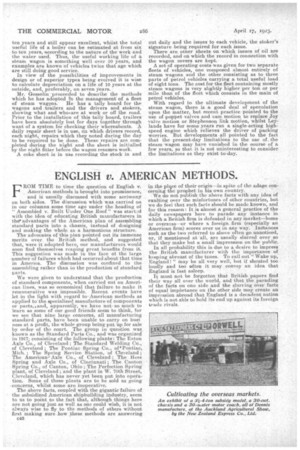ENGLISH v. AMERICAN METHODS.
Page 24

If you've noticed an error in this article please click here to report it so we can fix it.
FROM TIME to time the question of English v. American methods is brought into prominence, and is usually discussed with some acrimony on both sides. The discussion which was carried on in our columns some time ago under the heading of "Assembled v. Built Under One Roof!' was startsd with the idea of educating British manufacturers in the advantages of the American plan of assembling standard parts into a chassis, instead of designing and making the whole as a harmonious structure. The advocates of this plan pointed out its immense merits over the British method, and suggested that, were it adopted here2 our manufacturers would soon find themselves reaping great benefits from it. This suggestion was made in the face of the large -number of failures which had occurred about that time in America. The discussion was confined to the assembling rather than to the production of standard parts.
We were given to understand that the production of standard components, when carried out on American lines, was so economical that failure to make it remunerative was impossible. Recent events have let in the fight with regard toAmerican methods as applied to the specialized manufacture of components or parts,,and, apparently, we have not. so much to learn as some of our good friends seem to think, for we see that nine large concerns, all manufacturing standard parts, have been unable to carry on busi ness at a profit, the whole group being put up for sale by order of the court. The group in question was known as the Standard Parts Co., and was organized in 1917; consisting of the following plants : The Eaton Axle Co., of Cleveland ; The Standard Welding Co., of Cleveland ; The Pontiac Spring Co., oPPontiae, Mich. ; The Spring Service Station, of Cleveland ; The Americana Axle Co., of Cleveland ; The Hess Spring and Axle Co., of Cincinnati ; The Canton Spring Co., of Canton, Ohio ; The Perfection Spring plant, of Cleveland ; and the plant in W. 70th Street, Cleveland, which has never yet been put into opefation. Some of these plants are to be sold as going concerns, whilst some are inoperative. . The above facts, coupled with the gigantic failure of the subsidized American shipbuilding industry, seem to us to point to the fact that, although things here are not going just as well as one could wish, it is not always wise to fly to the methods of others without first making sure haw these methods are answering e40
in the ple,ce of their origin—in spite of the adage concerning the prophet in his own country..
We do not puliish the above facts with any idea of exulting over the misfortunes of other countries, but we .do feel that such facts should be made known, and for this reason: It is almost a general practice of the daily newspapers here to parade any instance in which a British firm is defeated in any market—home or overseas—or where a foreign firm (especially an American firm) scores over us in any way. Instances such as the two referred to above often go unnoticed, or, if mentioned at all, are usually slurred over so that they make but a small impression on the public.
In all probability this is due to a desire to impress the British manufacturer with the importance of keeping abreast of the times. To call out Wake up, England ! " may be all very well, but if shouted too loudly and too often it may convey an idea that England is fast asleep.
It must not be forgotten that British papers find their way all over the world, and that the parading of the facts on one side and the slurring over facts of equal impbrtanee on the other side may create an impression abroad that England is a decadent nation which is not able to hold its end up against its foreign trade rivals.






























